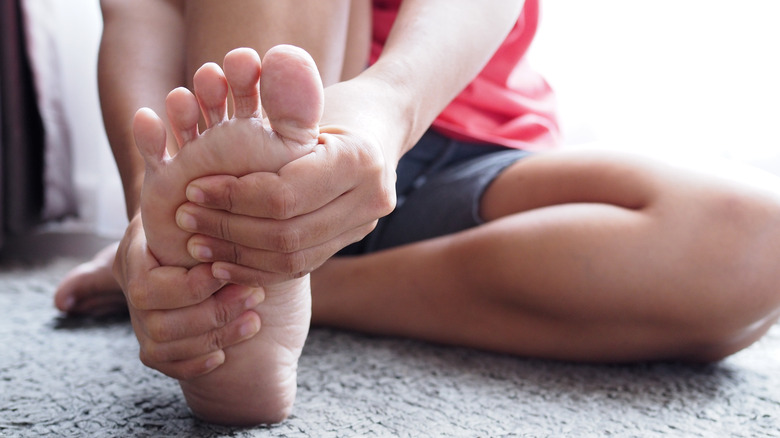What It Really Means When You Get A Cramp In Your Foot
If you've ever had a sudden painful spasm in your foot, you're not alone. In one study focused on adults who suffered from leg cramps, roughly 61% of the participants reported cramping in their feet at night and 40% reported cramping in their feet during the day (via National Institutes of Health).
According to the experts at Healthline, getting a cramp in your foot is typically not serious. One possible cause is inactivity. This is because sitting for long stretches — especially with poor posture — can affect blood flow to the feet and compress the nerves. Alternatively, another cause could be due to overextending your feet. Overextension can cause fatigue in your feet, leading to less oxygen circulation, which sets the stage for potential cramping. Also, consider the shoes you wear. A shoe that doesn't fit properly or provide enough support could lead to cramps, especially if you tend to stand on hard surfaces for a good part of the day.
If you are taking certain medications, such as blood pressure medication or birth control pills, these could potentially be the cause of the cramps. And if you suffer from certain medical conditions, such as spinal stenosis, metabolic issues, or osteoarthritis, you may be more susceptible to foot cramps.
How to relieve and prevent foot cramps
If you are experiencing a cramp in your foot, stretching is the best way to provide some immediate relief, according to experts at Medical News Today. They suggest a seated exercise involving the heels and toes that begins with your feet on the floor. Start by raising your heels up, while keeping your toes on the ground. Hold for two seconds, and then bring the heels back down to the starting position. Do the same process with the toes, while leaving the heels stationary. They recommend repeating this sequence five times. Another seated stretch sequence they recommend involves first raising and then curling the toes several times. They also suggest stretching your calves.
As far as prevention, performing stretches regularly may be helpful. Also, look at adding more potassium to your diet. Potassium is known for supporting a number of systems in the body, as well as regulating muscle contractions and increasing blood flow through the muscles. Upping your magnesium levels may also help, as cramping and involuntary muscle reactions can be due to moderate-to-severe magnesium deficiency. If you're pregnant and experiencing foot cramps, experts believe this could be due to low calcium levels, so it may be worth talking to your doctor about adding calcium-rich foods or a calcium supplement to your diet (via Medical News Today).
If painful foot cramps persist after you try a few of these at-home methods, especially if the cramps are disrupting your sleep, it may be time to consult your doctor.


